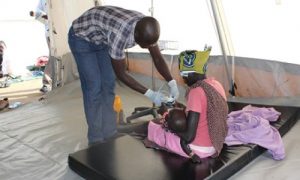Mingkaman- Health Link South Sudan (HLSS) has launched its integrated community case management (iCCM) of Malaria, Diarrhoea and Pneumonia in Mingkaman’s internally displaced persons’ (IDPs) camp in Awerial County of Lakes state.
This (iCCM) is a global strategy to deliver lifesaving treatments to sick children suffering from common childhood diseases at community level within 24 hours of the onset of illness.
The three diseases according to HLSS’s Programme Coordinator Moses Akera are the leading causes of illnesses among children in the camp.
 |
| Malaria is the leading disease burden among children in Mingkaman, Awerial County, Lakes State. |
“Malaria, Diarrhoea and Pneumonia are the top causes of morbidity and mortality in the country,” said Akera at the launch of the project. “The goal of this project is to quickly increase access to correct drugs for treatment of malaria, diarrhoea and Pneumonia.”
HLSS with support from the United Nations Children Fund (UNICEF) trained a total of 67 community based drug distributors (CBDs), 12 supervisors and trainers of trainees respectively in Mingkaman in order to support the treatment of the trio in the community.
“The CBDs have been trained to correctly identify, treat and help prevent the three diseases as well as screening and referral of cases of acute malnutrition among children from 2-59 months. They are also trained to give health education and counseling to care givers of young children,” Akera explained.
The representative of Awerial County’s County Health Department Peter Alier urged HLSS and its partner UNICEF, to expand the iCCM programme to all parts of the county.
Emmanuel Douglas, Director of HLSS urged the IDP and host communities, the CHD and the community leaders to help report and sensitize their members of the availability of CBDs and anti-malarial drugs in the community.
He urged South Sudanese to arise and appreciate their local non-governmental organizations that he said many a time are despised by their own people in preference to international aid agencies.
“HLSS is a South Sudanese NGO. I know in this country, we don’t believe in our own selves. We don’t believe that we can solve our problems. It’s high time we believed in ourselves and solve our problems,” Douglas lamented. “As South Sudanese, we have to try and contribute towards the betterment and improvement of the living conditions of the people of our country.”
 |
| Malaria is the leading disease burden among children in Mingkaman, Awerial County, Lakes State. |
UNICEF’s Awerial County representative John Bono hailed HLSS for exhibiting competence and launching the iCCM programme but challenged the Organisation to seek international status so that South Sudanese can also contribute in providing humanitarian assistance to other countries.
Bono said, every two seconds, two children die of malaria of malaria as he urged the CBDs to work diligently in preventing malaria and encourage sleeping under mosquito nets.
At HLSS’ two health facilities in the area, malaria contributes to 27% of illnesses recorded followed by diarrhoea, malnutrition and pneumonia. Speaking as chief guest, the County Relief and Rehabilitation Commission coordinator John Parach urged aid agencies not to withdraw from Mingkaman as more than 70,000 IDPs still remain in the camp.
HLSS, a national Non-Governmental Organisation, offers comprehensive primary and secondary health services in its site One hospital and site Two PHCC in Mingkaman.